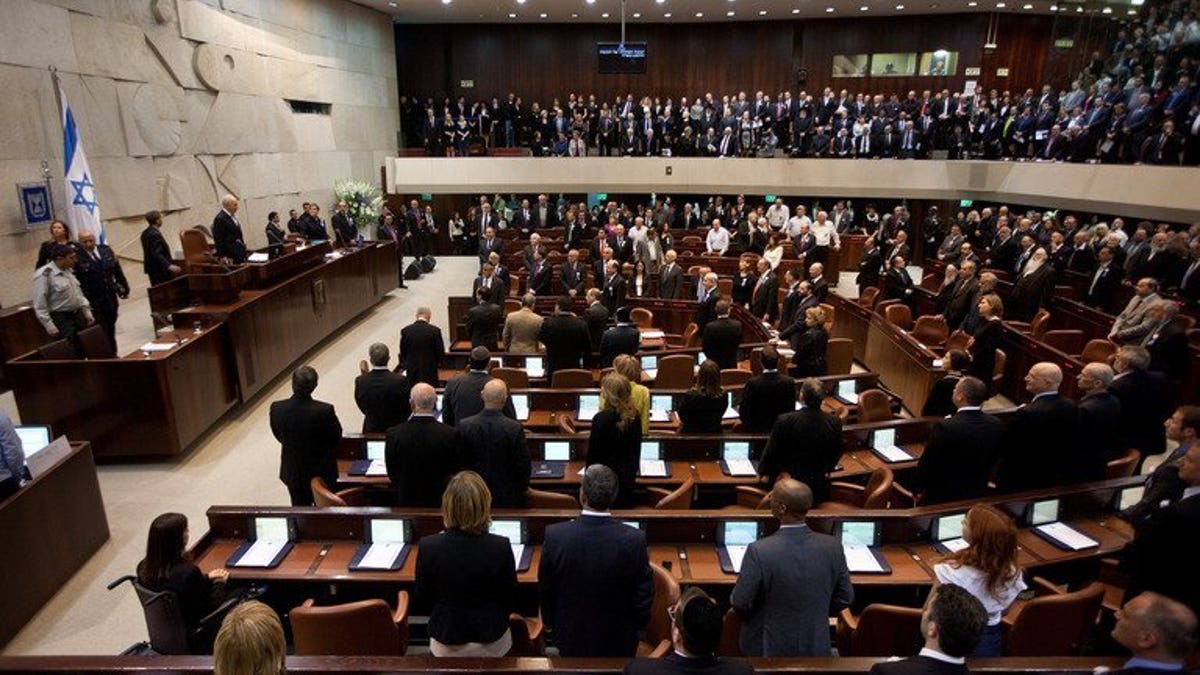Biden to visit Israel and Saudi Arabia in July
Former NSC Senior Director for the Middle East Michael Singh on Biden's upcoming travel to Israel and Saudi Arabia as Iran increases nuclear capability
JERUSALEM, Israel – Israel is headed to its fifth election in three years after Prime Minister Naftali Bennett announced Monday that efforts to stabilize his one-year-old fractious coalition had been exhausted, and, together with Alternate Prime Minister and Foreign Minister Yair Lapid, he was dissolving the government.
A bill to end the government’s term will be submitted next week for approval by Israel’s parliament, the Knesset, and parliamentary elections are expected to take place on Oct. 25, 2022.
BIDEN ADMINISTRATION OVERRULES TRUMP POLICY ON PALESTINIANS

Israeli Prime Minister Naftali Bennett attends a cabinet meeting at the Prime Minister's office in Jerusalem, Sunday, June 19, 2022. (Abir Sultan/Pool Photo via AP, File)
According to the coalition agreement between Bennett, Lapid, and eight other parties spanning the political spectrum, including for the first time an Arab-Israeli party, Lapid will now replace Bennett as a caretaker prime minister, while continuing as foreign minister. Bennett will take on the role of alternate prime minister and be responsible for dealing with Iran, Israeli media reported, with some suggesting that he is considering retiring completely from politics.
In an emotional televised statement, Bennett said dissolving the government was a "difficult moment but the right decision for the State of Israel."
"I decided to take on this very difficult position, but it was a Zionistic decision, and we created a government that was good for Israel," said Bennett, outlining the achievements made under his leadership, including tackling the two-year-old pandemic and reducing rocket fire from Palestinian militants Gaza.
Regarding Lapid replacing him, Bennett said: "I will do everything to ensure he succeeds."
In his statement, Lapid thanked Bennett "for putting the interests of the country ahead of his own" and said, "We will stay friends after this."
Lapid urged the public to unite and not turn on each other through what could be a tumultuous election period.
"The country needs to continue functioning," he said, "We still need to address matters like the high cost of living and the threat from Iran."

Israeli Prime Minister Naftali Bennett, right, and Foreign Minister Yair Lapid attend a cabinet meeting at the Prime Minister's office in Jerusalem, June 19, 2022. (Abir Sultan/Pool Photo via AP, File)
The latest political developments mean that Lapid will be the one to greet President Biden when he visits Israel next month but it throws into uncertainty any plans to establish formal ties between Saudi Arabia and Israel.
BIDEN TO VISIT SAUDI ARABIA NEXT MONTH SEEKING SOLUTIONS AS GAS TOPS $5 PER GALLON: REPORT
"Biden’s Middle East foreign policy victory will likely have to wait," said Jonathan Schanzer, Senior Vice President, Foundation for Defense of Democracies. "Israel’s political system respects decisions made by previous governments, particularly with peace deals. Still, the optics of advancing normalization with a temporary government may not sit well with the Saudis."
"It also may not sit well with the White House," said Schanzer, adding however, "It is important to underscore that the current upheaval will not derail the process of normalization — that’s already happening, it just may not be drawn out of the shadows yet."
Bennett, 50, will be the shortest-serving prime minister in Israel’s history after he replaced Benjamin Netanyahu, the country’s longest-serving prime minister who held the role for 12 years.
According to polls conducted in recent weeks, Netanyahu remains extremely popular and if an election was held right now, his Likud party would win the most number of seats in the Knesset but still not enough to form a government outright. In order to put together a viable government, any candidate needs the backing of at least 61 out of 120 Knesset members.

According to recent polls, former Prime Minister Benjamin Netanyahu remains extremely popular. The polls say that his Likud party would win the most seats if an election was held right now. (AP Photo/Oded Balilty, File)
ISRAEL'S NETANYAHU PLEDGES ‘WE’LL BE BACK' AS RECORD 12-YEAR RUN AS PRIME MINISTER ENDS
A survey carried out last week by Israel’s Channel 12 News found that a collaboration of right-wing/religious parties headed by Netanyahu could reach that number, making it possible for him to successfully form the next government — a feat that eluded him following four previous national elections that took place between 2019-2021.
The survey also found that the majority of the Israeli public is dissatisfied with the governing coalition, with more than half of those polled, 56 percent, of the opinion that Bennett’s government should not continue to exist.
"This is an evening of great news for the majority of the citizens in Israel," Netanyahu, who has led the opposition for the past year, said in a statement Monday. "Following a focused fight by the opposition in the Knesset and great suffering of the Israeli public, it is clear to everyone that the most failed government in this country’s history has ended."
ISRAEL-GAZA CONFLICT ESCALATES FOLLOWING PALESTINIAN ROCKET, TERROR ATTACKS
Netanyahu said the government was dependent on "terrorist supporters," a reference to the Arab party that was part of the coalition and has been accused of supporting Hamas and other terrorist groups. He also said the government had failed to keep the cost of living down, "imposed unnecessary taxes and endangered the Jewish character of our country."
He vowed to form broad, nationalist government headed by his Likud party.
CLICK HERE TO GET THE FOX NEWS APP

In order to form a viable government, candidates need the backing of at least 61 out of 120 Knesset members. (AFP/File)
Bennett has been struggling since April when his coalition whip, Idit Silman, a member of Bennett’s own Yamina party, announced that she was resigning from the coalition over ideological differences. Last week, another member of Bennett’s party, Nir Orbach, also said he would no longer support the coalition in vital votes in the parliament.
"Tonight, we are unfortunately closing the chapter on the change government," Defense Minister Benny Gantz wrote on Twitter, referring to the government whose tagline was bringing change after Netanyahu’s leadership. "A government whose year of activity has done much for Israeli society, its security, and resilience and will continue to work for it even during the transition period."
Yohanan Plesner, President of the Israel Democracy Institute, said Bennett’s decision to disperse the Knesset showed that "Israel’s worst political crisis did not end when this government was sworn into office, but rather merely receded only to return when this coalition failed to find a way to continue moving forward."
"While the Bennett-Lapid government undoubtedly played an important role by passing a budget and moving forward with other important legislation, this ongoing crisis will not come to an end until Israel’s leaders put their political differences aside and enact long-over-due electoral and constitutional reforms," he said.




















